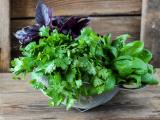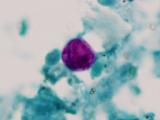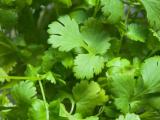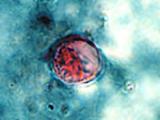Sep 24, 2004 (CIDRAP News)—Raw snow peas have been linked to an outbreak of cyclosporiasis in Pennsylvania that may have sickened almost 100 people, the Centers for Disease Control and Prevention (CDC) has announced.
A Sep 17 early-release Morbidity and Mortality Weekly Report (MMWR) article said CDC and Food and Drug Administration (FDA) officials are working with the Guatemalan government to determine the source of the Guatemalan-grown snow peas and how the produce became contaminated.
Pennsylvania public health officials noted about 50 potential cases of cyclosporiasis among residents, staff, and volunteers affiliated with a residential facility, MMWR said. Illnesses began in early June and lasted through early July.
Of 349 people with connections to the facility, 96 had symptoms including diarrhea, nausea, vomiting, fever, chills, and aches starting within 1 to 14 days of attending one of five special events there. Forty Cyclospora cayetanensis infections were laboratory-confirmed; the other 56 cases were termed probable C cayetanensis.
C cayetanensis is a one-celled parasite. Cyclosporiasis can occur when people ingest food or water contaminated with infected stool, the CDC said.
Investigation quickly focused on determining what foods had been served at five special events that took place at the facility in May and June, MMWR reported. Pasta salad containing snow peas was linked to the outbreak.
All of the snow peas used by the facility came from one container, which was purchased on May 21 and refrigerated until the last batch of salad was made on Jun 22, when the remaining peas were discarded. No peas were available for testing, but investigators said the snow peas were the only salad ingredient that meet criteria necessary to have caused the outbreak, according to MMWR. Those criteria were: being in all three batches of the salad served at the five events, being from the same lot, and being served only at those five events.
The outbreak marks the first instance of the parasitic disease implicating snow peas. Other culprits have included raspberries, basil, and mesclun lettuce from various countries.
The largest outbreak of cyclosporiasis, affecting more than 1,400 people in North America, took place in 1996, according to "Epidemiologic studies of Cyclospora cayetanensis in Guatemala," published in the November-December 1999 issue of Emerging Infectious Diseases. Raspberries were associated with the outbreak, prompting water-quality and sanitary-practice improvements on berry farms.
Guatemalan raspberries have since been implicated in other outbreaks, including a wedding in 2000 in Philadelphia, Pa. Fifty-four people fell ill after eating the wedding cake, which contained raspberries found to contain Cyclospora, according to an August 2002 article in Emerging Infectious Diseases.
CDC. Outbreak of cyclosporiasis associated with snow peas—Pennsylvania, 2004. MMWR Sep 24;53(37):876-8 (posted online Sep 17) [Full text]
See also:
1999 Emerging Infectious Diseases article
http://www.cdc.gov/ncidod/eid/vol5no6/bern.htm
2002 Emerging Infectious Diseases article
http://www.cdc.gov/ncidod/eid/vol8no8/02-0012.htm





















